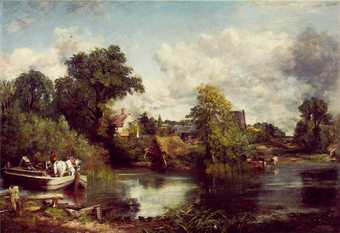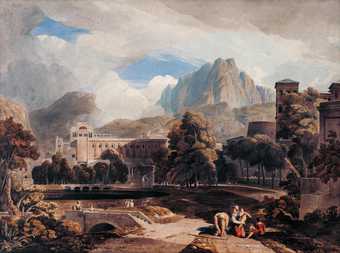John Constable looked down from the window at number 35 Charlotte Street.
‘Go away!’ he shouted, then pulled the curtain closed.
Death, in perfectly tailored trousers and a rakishly perched felt derby, tugged a fine gold watch from his vest pocket.
‘Mr Constable, it is time.’
Again, John Constable parted the heavy curtain, peered through the slit. He’d looked out of that window many times. Looked out of so many windows. Looking was what he did so well. He wished he were looking at Willy Lott’s cottage. He wished he were looking at Dedham Vale, or at the complex give and take between shadow and sunlight on the old mill in the woods. John Constable wished he were looking at anything other than the natty spectacle shuffling about on the cobblestones below. What did Browning call him? The pale priest of the mute people.
Constable gave no such esteem.
‘Go away, you fop!’
Death thumbed open a leather notebook, traced a page to its bottom, muttering the litany of contents.
‘Mr Constable, it is 31 March, of the year eighteen and thirty seven. You are on my list.’
Constable looked up the street, and out over the rooftops and spires of the city that had hemmed him in for twenty years. He’d all but given up working en plein air, choosing instead to bring more and more of the natural world into the studio, the canvases growing larger and larger. Constable searched the sky, his cloister and wellspring for years, but found nothing of note on that day. Nor, sadly, could he conjure up the solacing clouds. In a moment of despair, he grabbed the nearest thing at hand, yanked open the window and flung it at his morning’s tormenter.
When the glass vial of Field’s Orange Vermilion shattered at the insistent visitor’s feet, both Death and Constable groaned. Death, over the vibrant new pattern bestaining his immaculate black boots. The painter, over the loss of the expensive pigment.
‘Sir,’ Death said. ‘I am patient by nature, but you are truly taxing my reserves.’
A rustling from the upper room, then the thud of footfalls on the stairs. Death stepped up, expecting the hinges to creak, the latch to rattle, but instead there came the whisper of paper shoved under the door.
Death plucked the scrap from the walkway, studied it closely. An irregular fragment, hastily torn, awash with muted colour, still damp even, as if ripped from a work in progress. Death noted the tiny bits of undissolved paint caught in the paper’s tooth. Noted, too, the scribbled handwriting.
‘What’s this?’ Death asked.
John Constable spoke from behind the door.
‘It’s Turner’s address. Go and get him instead.’
‘John Constable,’ Death said, with careful deliberation.
‘Do you remember how you had to take some of your early large works out of the window in the stairwell?’
‘What’s your point?’ Constable asked.
‘I will be accommodated, sir. By whatever means necessary.’
The painter, tired and weary, considered his options. He thought of asking about his beloved Marie, gone nearly ten years now. Did she know that he’d finally been given the nod by the Academy, just a year after her death? But Constable couldn’t bear the thought of her name crossing the lips of the thing on the other side of the door. He pressed his forehead to the heavy planks and spoke.
‘Do you know what he said about me?’
‘Who?’ Death asked.
‘Turner.’
‘What did he say, Mr Constable?’
‘He walked into the gallery, with his spaniels at his heels. He looked at my work and said it was too bad the plaster had fallen from the ceiling on my painting.’
Death had pressed his own cool forehead to the door.
‘And they all laughed. They talked about Constable’s snow. All I wanted was to paint water so true you could hear it streaming from the canvas. To make a tree such that a man could find shade beneath it.’
Death, in his wisdom, let Constable speak.
‘Such a pompous man, that Turner. But his work. One could live with such pictures in the house.’
‘May I come in for a moment, good sir?’
‘But.’
And Death could hear the tremble in the man’s voice. ‘I have not finished yet.’
No surprise. Among all men, greater and lesser, it was the common plea.
Nor was Death surprised when Constable’s door finally swung open.
The scents of moss, stone and damp bark accompanied the dark agent into the crowded studio, and they comforted the painter.
‘A humble mind,’ Constable said. ‘The landscape painter must walk in the fields with a humble mind.’
‘Yes,’ Death said. ‘Yes, indeed.’
While Constable made ready to depart, Death busied himself admiring the studio.
‘It’s an impressive body of work, Mr Constable. You should be proud. I see you’ve embraced the palette knife.’
Despite his reputation, Death, as an ambassador, was not without compassion. Outside, on the street, Death could hear the auctioneers stropping their beaks, purses moistened by the news of Constable’s passing. Death knew that Samuel Joseph, the mask maker, was merely blocks away, en route to the studio. To bring a little comfort, to protect Constable from these eager vultures, Death engaged the man in conversation. They talked for a long, long time, and as the painter’s sense of ease grew he opened up to Death.
‘Still, after a lifetime, it’s nothing more than theory and pigment. I don’t know if, ultimately, I’ve told any truths.’
Death told him about the American boy, Thomas Cole. How the Hadleigh Castle painting had brought the young painter to tears.
‘He wept,’ Death said. ‘And took that passion back to his land.’
Death wouldn’t divulge the details, but hinted that an entire art movement may be ushered into being in no small way because of Constable’s late-career freedom with paint.
‘Your snow will continue to fall,’ Death said.
Constable liked the idea of this. He poured them each a snifter, and they sat drinking, moving in and out of quiet. He told Death how he went about making pictures. About how he never felt more alive than when standing before a six-foot canvas.
‘I painted by all the daylight we had.’
After a while, Constable asked the question that had been troubling him.
‘What am I dying of ?’
‘Some will call it violent indigestion.’
‘Hmmm.’
‘Can I take my paintbox?’
‘I don’t see why not,’ Death said.
‘I suppose we have to go soon,’ Constable said, resting the empty brandy glass on his work table.
‘Yes, soon.’
‘Might I make a somewhat embarrassing request?’
Death was intrigued.
‘Yes?’
‘Could we possibly travel by omnibus? I haven’t ridden in one yet.’
The minister plenipotentiary loved the idea.
‘Would it be possible to pass by Nayland Church? I’d like to see my altarpiece one last time.’
‘Yes, of course,’ Death said.
On the way out, the painter hesitated. Death stood, patiently, in the open doorway.
‘Just a moment,’ Constable said. ‘I’m reading this book, Life of Cowper, and I’ve just about finished. Maybe I’ll take it for the journey. Do you know Southey’s work?’ he asked.
But by then Constable was too far up the stairs to hear Death’s reply.



